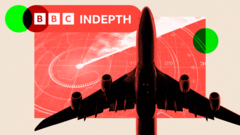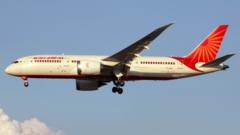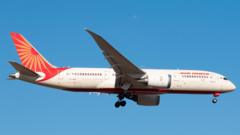The UK government has assembled a team of scientists known as "Time Lords" to create a portable atomic clock system to counter GPS jamming, a significant concern for aviation and economic stability amid rising geopolitical tensions.**
Time Lords Unveil Ambitious Plan to Combat GPS Jamming Threats**

Time Lords Unveil Ambitious Plan to Combat GPS Jamming Threats**
A group of UK scientists, the "Time Lords," is on a mission to develop a secure alternative to GPS, addressing growing GPS jamming threats to aviation and critical infrastructure.**
The aviation sector is facing an increasing threat from GPS jamming, prompting urgent action from scientists and the UK government. Notably, a Ryanair flight from London to Vilnius, Lithuania, had to abort its landing due to unexplained GPS signal interference, underscoring the dangers that could arise from compromised navigation systems. In the past three months, over 800 incidents of GPS interference have been reported in Lithuania, with neighboring countries warning that Russia might be behind these disruptions.
The disruption of GPS signals poses severe risks beyond aviation, as various sectors rely on this technology for crucial operations. A UK government report estimated that systematic GPS jamming could cost the national economy £1.4 billion daily, leading to its classification as a major risk. In response, the government has enlisted a group of scientists dubbed the "Time Lords" to develop an alternative navigation solution that sidesteps satellite dependencies.
The initiative seeks to leverage advancements in atomic clock technology, aiming to create portable and robust devices capable of delivering precise timing and location data. The challenge mirrors historical innovations in timekeeping, particularly John Harrison's development of a portable marine clock that revolutionized navigation in the 18th century. Similarly, the Time Lords envision breakthroughs that could reshape time measurement for modern applications, including finance and telecommunications.
Quantum technologies are at the heart of this endeavor, potentially leading to breakthroughs in navigation and timekeeping. While much attention has been on quantum computing, the early promises lie within the realms of navigation systems. Researchers anticipate having new navigation systems available within the next two to five years.
By focusing on optical clocks, which utilize laser stimulation for superior accuracy over traditional caesium clocks, the project aims to create devices that can operate effectively outside of laboratory conditions. The ultimate goal is to integrate these advancements into everyday technology, such as smartphones, providing a personal GPS alternative while mitigating the risks of external signal interference.
Current prototypes have demonstrated the technology's potential in test flights, but the path to miniaturization and affordability remains challenging. Researchers are acutely aware of historical parallels, as they strive to enhance the robustness and reliability of these quantum-based systems under real-world conditions.
As GPS jamming continues to disrupt military operations in conflict zones like Ukraine, the impetus behind these innovations grows stronger. The Time Lords and their collaborators remain committed to ensuring that the future of navigation is secure, efficient, and resilient against external threats, while potentially transforming the measurement of time for generations to come.
The disruption of GPS signals poses severe risks beyond aviation, as various sectors rely on this technology for crucial operations. A UK government report estimated that systematic GPS jamming could cost the national economy £1.4 billion daily, leading to its classification as a major risk. In response, the government has enlisted a group of scientists dubbed the "Time Lords" to develop an alternative navigation solution that sidesteps satellite dependencies.
The initiative seeks to leverage advancements in atomic clock technology, aiming to create portable and robust devices capable of delivering precise timing and location data. The challenge mirrors historical innovations in timekeeping, particularly John Harrison's development of a portable marine clock that revolutionized navigation in the 18th century. Similarly, the Time Lords envision breakthroughs that could reshape time measurement for modern applications, including finance and telecommunications.
Quantum technologies are at the heart of this endeavor, potentially leading to breakthroughs in navigation and timekeeping. While much attention has been on quantum computing, the early promises lie within the realms of navigation systems. Researchers anticipate having new navigation systems available within the next two to five years.
By focusing on optical clocks, which utilize laser stimulation for superior accuracy over traditional caesium clocks, the project aims to create devices that can operate effectively outside of laboratory conditions. The ultimate goal is to integrate these advancements into everyday technology, such as smartphones, providing a personal GPS alternative while mitigating the risks of external signal interference.
Current prototypes have demonstrated the technology's potential in test flights, but the path to miniaturization and affordability remains challenging. Researchers are acutely aware of historical parallels, as they strive to enhance the robustness and reliability of these quantum-based systems under real-world conditions.
As GPS jamming continues to disrupt military operations in conflict zones like Ukraine, the impetus behind these innovations grows stronger. The Time Lords and their collaborators remain committed to ensuring that the future of navigation is secure, efficient, and resilient against external threats, while potentially transforming the measurement of time for generations to come.






















